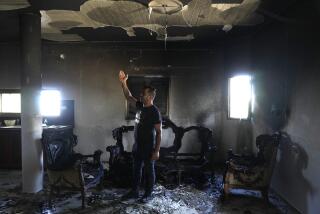Settlers Endorse Civil Disobedience
- Share via
JERUSALEM — Israel’s mainstream settler movement on Monday issued its sharpest challenge yet to Prime Minister Ariel Sharon’s plan to uproot Jewish settlements in the Gaza Strip, endorsing a call for settlers to resist the evacuation through civil disobedience.
In past months, some extremist settler leaders have made much more strident statements, including personal threats against the prime minister. However, Monday’s appeal was the first of its kind from the leadership of the Yesha Council, an umbrella group that is believed to broadly represent the views of the more than 225,000 settlers who live in the West Bank and Gaza.
“The proposal to expel Jews from their homes is an immoral decision and a breach of human rights,” the council’s chairman, Bentzi Lieberman, told reporters. “We will maintain a determined stand against a decision that is, to our minds, a crime on a national and historical scale.”
Sharon, who is moving to finalize an alliance with the Labor Party, said the withdrawal plan would go forward.
Lieberman’s statement followed a communique issued a day earlier by a prominent regional settler leader, Pinchas Wallerstein, who called on settlers and their supporters to “disobey the ‘transfer’ law en masse, even at the price of a prison term.”
Urged by senior members of Sharon’s government to repudiate the remarks, the settler leadership instead affirmed them.
“The Yesha Council stands behind Pinchas Wallerstein,” Lieberman said.
Until now, Yesha -- a Hebrew acronym for Judea, Samaria and Gaza, the first two being the biblical names of areas making up the West Bank -- had not formally endorsed breaking the law to prevent the evacuation.
Lieberman stressed that the group was not advocating violence. “We will not call for a civil war,” he said.
In a follow-up statement Monday, Wallerstein reiterated that settlers and their supporters should be prepared to carry out illegal acts if necessary.
“What will [the authorities] do, make mass arrests?” he asked in his original letter. “Open detention camps?”
Legislation being weighed by the Knesset would set prison terms of up to three years for physically resisting the dismantling of settlements.
Sharon, one of the chief architects of the settlement movement, kept to his custom of expressing sympathy for the settlers, even though he termed Wallerstein’s remarks “harsh.”
For some Israelis, the increasingly vitriolic tone of the debate recalls the 1995 assassination of Prime Minister Yitzhak Rabin. The late leader was reviled by rightists because of his support for territorial concessions to the Palestinians and gunned down by a young ultranationalist.
The settlers’ confrontation with Sharon came as negotiations to bring the left-leaning Labor Party into the government appeared to near completion.
Lawmakers on Monday gave preliminary approval to a measure that would allow Labor Party leader Shimon Peres to be named a deputy prime minister. Sharon’s deputy from his Likud Party, Ehud Olmert, will keep his post.
The prime minister lost his parliamentary majority during infighting over the Gaza plan, and the alliance with Labor is meant to ensure that he will have the votes in the 120-member Knesset to keep the pullout on track. Under Sharon’s timetable, the 21 settlements of Gaza, together with four small ones in the northern West Bank, are to be relinquished next year.
Wallerstein called the coalition Sharon is seeking to build with Labor “illegitimate,” language that alarmed some members of parliament.
“This is a call to mutiny against the state,” said lawmaker Zehava Galon of the leftist Yahad party. “There’s a need for a clear message from law enforcement authorities that you can’t engage in sedition without being punished.”
Israeli media reported that Atty. Gen. Menachem Mazuz had asked the state prosecutor to investigate whether Wallerstein’s remarks constituted illegal incitement.
More to Read
Sign up for Essential California
The most important California stories and recommendations in your inbox every morning.
You may occasionally receive promotional content from the Los Angeles Times.













